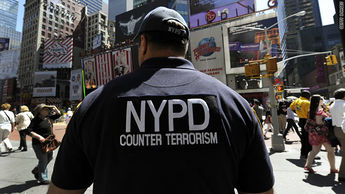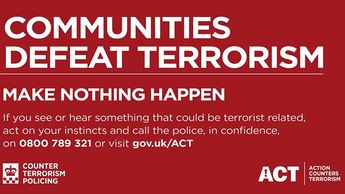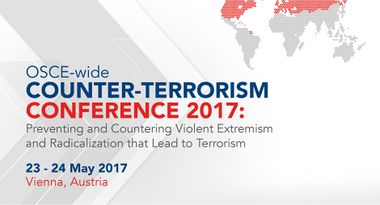Difference between revisions of "Counter-terrorism"
(Orwellian language)) |
|||
| Line 3: | Line 3: | ||
|image=Counter-terrorism.jpg | |image=Counter-terrorism.jpg | ||
|so_called=1 | |so_called=1 | ||
| − | |constitutes=polarising perspective | + | |constitutes=polarising perspective, Orwellian language |
|sourcewatch=http://www.sourcewatch.org/index.php/Counter-terrorism | |sourcewatch=http://www.sourcewatch.org/index.php/Counter-terrorism | ||
|description=A component of the military-industrial-terrorism-congressional complex which has seen a dramatic growth since 9-11. | |description=A component of the military-industrial-terrorism-congressional complex which has seen a dramatic growth since 9-11. | ||
| Line 71: | Line 71: | ||
The global business of "counter-terrorism" has boomed since the attacks of [[September 11, 2001]], resulting in a large expansion of everything from research and development of new [[mass surveillance]] technologies to conferences to "anti-terror legislation". New and heavily funded government agencies such as the [[US Department of Homeland Security]] with its [[Transportation Security Administration]] subsidiary have become a source of lucrative government contracts. A small number of large corporations have profited greatly from the ability to get these government contracts, often through an opaque process clouded with claims of "[[national security]]". | The global business of "counter-terrorism" has boomed since the attacks of [[September 11, 2001]], resulting in a large expansion of everything from research and development of new [[mass surveillance]] technologies to conferences to "anti-terror legislation". New and heavily funded government agencies such as the [[US Department of Homeland Security]] with its [[Transportation Security Administration]] subsidiary have become a source of lucrative government contracts. A small number of large corporations have profited greatly from the ability to get these government contracts, often through an opaque process clouded with claims of "[[national security]]". | ||
| − | "Counter terrorism professionals usually possess at least a four-year bachelor’s degree and may look forward to a median salary of $77,210 annually."<ref>https://www.criminaljusticedegreeschools.com/ | + | "Counter terrorism professionals usually possess at least a four-year bachelor’s degree and may look forward to a median salary of $77,210 annually."<ref>https://www.criminaljusticedegreeschools.com/crim |
| − | |||
| − | |||
| − | |||
| − | |||
| − | |||
| − | |||
| − | |||
| − | |||
| − | |||
| − | |||
Revision as of 16:04, 29 January 2019
(polarising perspective, Orwellian language) | |
|---|---|
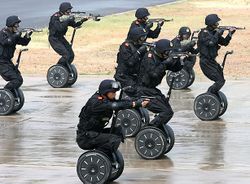 | |
| Interest of | • Anne Aly • Club de Berne • Jonathan Davis • Global Counter-Terrorism Coordination Compact • James Hart • International Centre for Counter-Terrorism • Le Cercle • Nikita Malik • Ken Moskow • Office for Security and Counter-Terrorism • Powerbase • Rianne Siebenga • Mike Smith • Spinwatch • Jim Steele • Hunter Treseder • University of St. Andrews |
| A component of the military-industrial-terrorism-congressional complex which has seen a dramatic growth since 9-11. | |
"Counter-terrorism" (or counterterrorism) is part of the military-industrial-terrorism-congressional complex. After September 11, 2001 governments and commercially-controlled media promoted the concept of the "war on terror", causing a boom for the MICC in general, in particular for manufacturers of weapons and mass surveillance equipment.
Contents
Official narrative
"Counter-terrorism" is a no holds barred effort to oppose "terrorism". Although they may use similar means, "counter-terrorists" are the very opposite of "terrorists".
History
Douglas Valentine reports that in or around 1964 the CIA set up "counter terror teams" as a part of Project Phoenix. These groups were used to try to terrorise villagers away from support of the Vietcong and they used informers to identify Vietcong members in rural areas.[1] These were later renamed "Provincial Reconnaissance Units" after CIA officials "became wary of the adverse publicity surrounding the use of the word 'terror'".[2]
JCIT
The 1979 JCIT was an important meeting to establish and standardise the modern ideology of "terrorism", "counter-terrorism" and the "war on terror". At least 4 of the speakers at that meeting had attended one or more meetings of Le Cercle, a group with links to the SOE. Many Cercle members also have set up "terrorism research" organisations to promote their narrative and offer jobs and publicity to "terror experts".
Methods
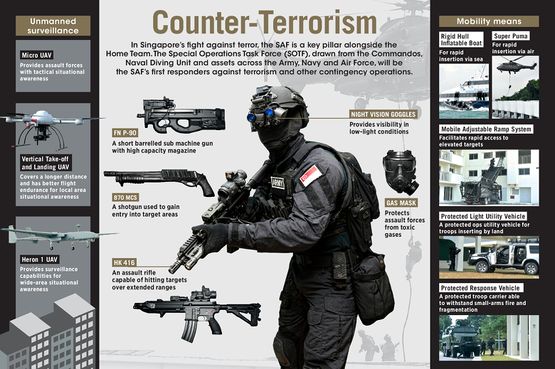
In some countries, "counter-terrorists" are legally permitted to use violent methods such as assassinations or torture[citation needed] to oppose "terrorists". These is rarely referred to as such - alternative language such as "targeted killings" or "preemptive neutralization" is preferred.[3]
"Terrorism research"
- Full article:
 Terrorism research
Terrorism research
- Full article:
"Terrorism research" is conducted by a number of research institutions, perhaps most notably the Centre for the Study of Terrorism and Political Violence at the University of St. Andrews. The discipline has minimal academic rigour and is for the most part not empirically based. Nafeez Ahmed has gone so far as to call it "bullshit".[4] Given its lack of explanatory power, one might wonder why such an academic discipline continues without a serious shake up. A historical comparison might clarify the role of this 'pseudoscience' might help - in the middle ages, witches were tracked down supposedly by experts in witchfinding. The RAND Corporation/St Andrews database has literally nothing to say about false flag terror - it simply excludes such events.
Militarization
In US in particular, many groups such as police forces and intelligence agencies have developed "counter-terrorism" branches which have been criticised for profiling (and sometimes harassing) non-violent, law-abiding activists such as peace campaigners. Their lack of oversight and close liaison with corporations have been criticised, especially the establishment of quasi-autonomous fusion centers.[5]
Often these special forces are created in the immediate aftermath of a violent "terrorist" incident, such as the National Investigation Agency, which was created in response to the 2008 Mumbai attacks.
Counter-terrorist hotlines
Many countries are encouraging people to report "suspicious behaviour". This is sometimes left undefined, but sometimes a checklist is published, such as "appearing to study CCTV or other security arrangements".[6]
Extent
Many national governments are engaged in the business of "counter terrorism".
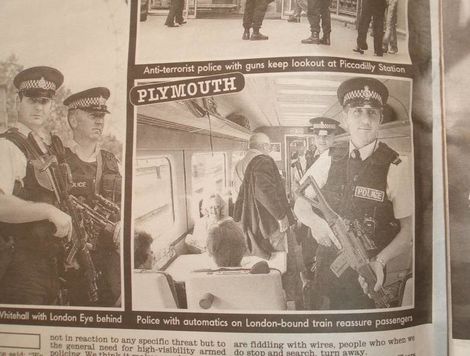
UK
- Full article: CONTEST/Prevent
- Full article: CONTEST/Prevent
In 2003, the UK government adopted a "counter-terrorism" strategy of which one element was named "Prevent" (= "Preventing Violent Extremism"). This was widely criticised on a variety of grounds, in particular for emphasising on "Islamist terror", noting for example:
“The current threat from Islamist terrorism is serious and sustained. It is genuinely international in scope, involving a variety of groups, networks and individuals who are driven by particular violent and extremist beliefs. It is indiscriminate – aiming to cause mass casualties, regardless of the age, nationality, or religion of their victims; and the terrorists are often prepared to commit suicide to kill others. Overall, we judge that the scale of the threat is potentially still increasing and is not likely to diminish significantly for some years.
”
(July 2006) [7]
This is all the more remarkable since, according to Europol, less than 1% of terrorist incidents in Europe are by Islamic terrorists. Sociology professor David Miller has suggested that arms of the UK government such as MI5 are deliberately encouraging Islamophobia through such documents and through information provided to the commercially-controlled media.[8] This would fit with Sibel Edmonds' revelations about Operation Gladio B.
CONTEST
- Full article: CONTEST
- Full article: CONTEST
In 2003, the UK government launched CONTEST, a "counter-terrorism" strategy. This was focused on "Islamic terror" and was widely criticised by civil liberties advocates and others, who suggested that it was being used to excuse unwarranted mass surveillance.[9]
ACT: Action Counters Terrorism
- Full article: Action Counters Terrorism
- Full article: Action Counters Terrorism
In March 2017, the UK government launched ACT: Action Counters Terrorism, an updated "branding platform" for its "counter-terrorist" efforts.
China
The Chinese government is organising "counter-terror exercises".[10]
Targets
"Counter-terrorist" teams are not used only on "terrorists". The military (SWAT team) ethos facilitates use of "counter-terrorist" forces on civilian targets such as Ian Puddick.[11]
Business
The global business of "counter-terrorism" has boomed since the attacks of September 11, 2001, resulting in a large expansion of everything from research and development of new mass surveillance technologies to conferences to "anti-terror legislation". New and heavily funded government agencies such as the US Department of Homeland Security with its Transportation Security Administration subsidiary have become a source of lucrative government contracts. A small number of large corporations have profited greatly from the ability to get these government contracts, often through an opaque process clouded with claims of "national security".
"Counter terrorism professionals usually possess at least a four-year bachelor’s degree and may look forward to a median salary of $77,210 annually."<ref>https://www.criminaljusticedegreeschools.com/crim
- ↑ https://soundcloud.com/guns-and-butter-1/phoenix-as-the-model-for-homeland-security-and-the-war-on-terror-douglas-valentine-358
- ↑ McCoy, Alfred W. (2006). A question of torture: CIA interrogation, from the Cold War to the War on Terror. Macmillan. p. 63. ISBN 978-0-8050-8041-4.Page Module:Citation/CS1/styles.css must have content model "Sanitized CSS" for TemplateStyles (current model is "Scribunto").
- ↑ http://www.unwelcomeguests.net/archive/747
- ↑ Document:The Astonishingly Crap Science of 'Counter-Extremism'
- ↑ http://www.unwelcomeguests.net/728
- ↑ https://www.thesun.co.uk/living/3726450/suspicious-behaviour-report-police-terror-attack/
- ↑ https://www.gov.uk/government/uploads/system/uploads/attachment_data/file/272320/6888.pdf Countering International Terrorism: The United Kingdom’s Strategy
- ↑ http://www.unwelcomeguests.net/672
- ↑ Government Anti-Terrorism Strategy Spies on Innocent 16 October 2009, the Guardian - accessed 25 November 2009
- ↑ http://africasecuritycounterterrorism.com/chinese-armed-police-hold-anti-terror-drill-in-xinjiang/
- ↑ http://www.unwelcomeguests.net/672
